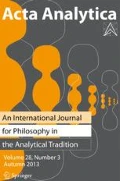Abstract
J.J.C. Smart famously complained that rule utilitarianism is incoherent, and that rule utilitarians are guilty of “rule worship”. Much has been said about whether Smart’s complaint is justified, but I will assume for the sake of argument that Smart was on to something. Instead, I have three other goals. First, I want to show that Smart’s complaint is a specific instance of a more general objection to a moral theory—what I will call the Incoherence Objection. Second, I want to illustrate how the Incoherence Objection can apply both to consequentialist and, surprisingly, some nonconsequentialist theories. Finally, I want to demonstrate at least one way nonconsequentialist theories that make use of rules, principles, and the like can dodge the Incoherence Objection.
Similar content being viewed by others
Notes
Of course, there are other ways to specify rule utilitarianism. For present purposes, I don’t think too much hangs on exactly how we spell it out. I should, however, explicitly exclude those versions of rule utilitarianism according to which the value of rules does not derive merely from the value of the utility of general compliance with them; see (Hooker 2000, 99–102). And it also matters that I am considering RU to be a criterion of right action, and not merely a decision procedure.
Whether Scanlon’s actual view is vulnerable to the Incoherence Objection would require the sort of exegesis I am no position to undertake here. Again, I discuss contractualism only to illustrate my main contention, not to rebut any particular view.
References
Hooker, B. (2000). Ideal Code, Real World. Oxford: Oxford University Press.
Lyons, D. (1965). The Forms and Limits of Utilitarianism. Oxford: Oxford University Press.
Millgram, E. (1997). Practical Induction. Cambridge, MA: Harvard University Press.
Millgram, E. (2004). Does the Categorical Imperative Give Rise to a Contradiction of the Will? The Philosophical Review, 112, 525–560.
Smart, J. J. C. (1956). Extreme and Restricted Utilitarianism. Philosophical Quarterly, 6, 344–354.
Acknowledgements
I thank Thad Metz, Dale Miller, and the audience at a meeting of The International Society for Utilitarian Studies for their help and suggestions.
Author information
Authors and Affiliations
Corresponding author
Rights and permissions
About this article
Cite this article
Wiland, E. The Incoherence Objection in Moral Theory. Acta Anal 25, 279–284 (2010). https://doi.org/10.1007/s12136-010-0098-5
Received:
Accepted:
Published:
Issue Date:
DOI: https://doi.org/10.1007/s12136-010-0098-5



